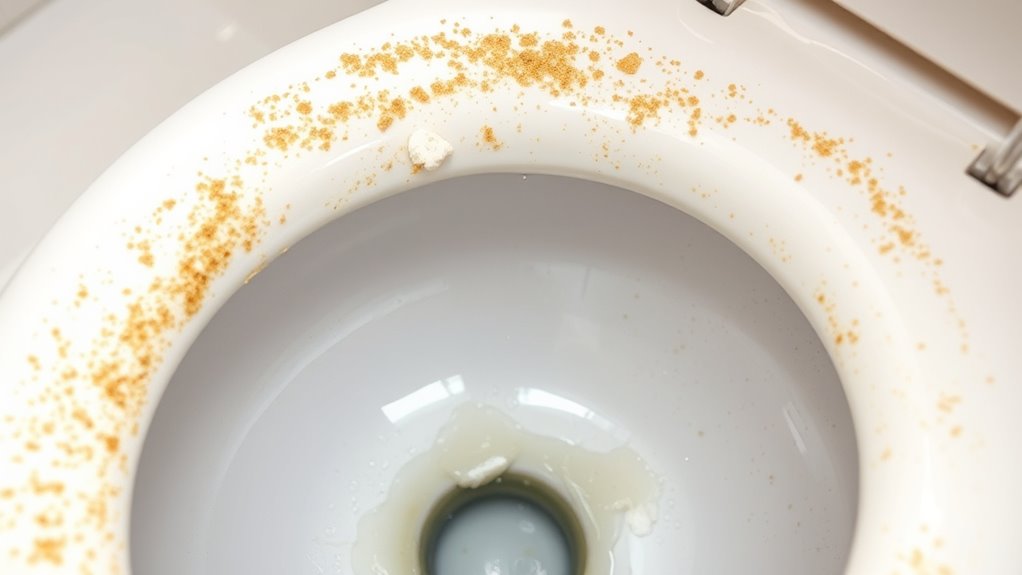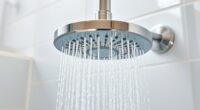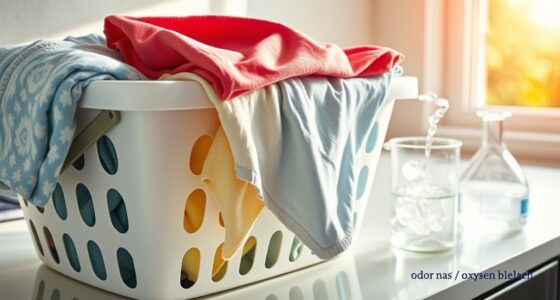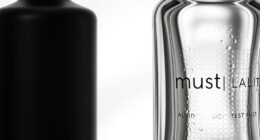I’ve found that persistent bathroom urine odors often come from mineral buildup and changes in surface chemistry that trap smells. Cleaning with pH-neutral solutions and enzyme-based cleaners can break down organic residues, while vinegar and baking soda help dissolve mineral deposits. Regular scrubbing and addressing pH imbalance prevent odors from returning. If you keep exploring, you’ll discover even more effective tactics to keep your bathroom fresh and odor-free long-term.
Key Takeaways
- Proper pH-neutral cleaners help break down urine deposits and restore surface chemistry, preventing odor molecule adhesion.
- Enzymatic cleaners digest organic compounds like urea and ammonia, reducing long-term bathroom odors.
- Vinegar and baking soda effectively dissolve mineral buildup without harsh chemicals, improving surface cleanliness.
- Physical scrubbing combined with cleaning solutions removes embedded odors and mineral deposits from porous surfaces.
- Consistent cleaning and addressing mineral deposits prevent odor absorption, ensuring a fresher bathroom environment.
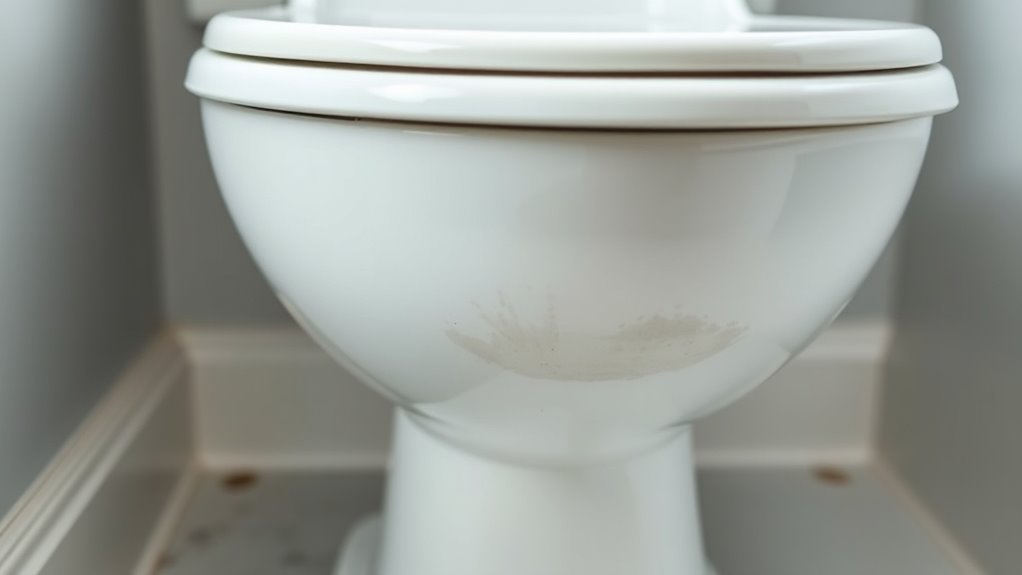
Dealing with urine odor in bathrooms can be frustrating, especially when it seems to linger despite regular cleaning. One key factor often overlooked is the pH imbalance caused by urine deposits. Urine contains compounds that can alter the pH level of surfaces, making them more acidic or alkaline over time. When the pH balance shifts, it creates an environment where odor molecules become trapped, making it harder to eliminate the smell completely. This imbalance also encourages mineral buildup, which compounds the problem by creating a rough surface that traps more residue and odor. To combat this, I’ve learned that restoring the proper pH balance is essential. Using pH-neutral cleaners helps to break down these deposits without further disturbing the surface chemistry. It’s like resetting the environment to prevent odor molecules from sticking around.
Another aspect I focus on is odor absorption. Porous surfaces such as tiles, grout, and even certain plastics tend to absorb odors, especially if urine residues aren’t thoroughly cleaned. No matter how often I scrub, if I don’t address the underlying mineral deposits and pH issues, the smell persists because the odors are embedded deep inside the material. That’s why I prioritize cleaning with enzyme-based solutions, which are designed to digest organic compounds like urea and ammonia found in urine. These enzymes penetrate porous surfaces and break down the molecules that cause the foul smell, rather than just masking it with air fresheners. I’ve found that regular application of such cleaners, combined with physical scrubbing, markedly reduces odor absorption over time.
Mineral buildup is another culprit that worsens urine odor problems. Over time, minerals from hard water and urine residues crystallize into deposits that cling stubbornly to surfaces. These deposits aren’t just unsightly—they also harbor bacteria and odor-causing compounds. To tackle this, I use a mixture of vinegar and baking soda, which effectively dissolves mineral deposits without harsh chemicals. Applying this mixture and letting it sit for a few minutes helps to loosen the deposits, after which I scrub thoroughly. This process not only removes the visible buildup but also reduces the odor absorption capacity of surfaces. Additionally, understanding the impact of AI in cybersecurity can help develop smarter cleaning tools that detect and target mineral deposits more efficiently.
In essence, dealing with urine odor isn’t just about surface cleaning; it’s about understanding the chemistry behind the problem. Restoring the pH balance, preventing mineral buildup, and addressing odor absorption at its source make a momentous difference. When I combine these tactics, I find that the bathroom stays fresher longer, and the stubborn odors become much easier to manage. It’s a matter of consistency and using the right cleaning strategies to break the cycle of lingering smells.
Frequently Asked Questions
What Homemade Remedies Effectively Neutralize Urine Odor?
If you’re wondering about homemade remedies to neutralize urine odor, I recommend using natural enzymes and baking soda. I mix a solution of natural enzyme cleaner and spray it directly on the affected area—enzymes break down the odor-causing molecules. Then, I sprinkle baking soda over it to absorb any remaining smells. Let it sit for a few hours or overnight, and you’ll notice a fresh, odor-free bathroom.
How Often Should Bathroom Tiles Be Deep Cleaned for Odor Prevention?
Think of your bathroom tiles as the face of a well-kept home—needing regular attention to stay fresh. I recommend a thorough deep cleaning at least once a month. This cleaning schedule helps prevent mineral build-up and keeps odors at bay. Regular tile maintenance isn’t just about appearance; it’s about creating a clean, welcoming space. Stay consistent, and your bathroom will stay bright and odor-free longer.
Can Mineral Deposits Cause Long-Term Damage to Bathroom Fixtures?
Mineral deposits can indeed cause long-term damage to bathroom fixtures. I’ve seen mineral corrosion weaken metal components and lead to fixture deterioration over time. This buildup, often from hard water, accelerates rust and corrosion, compromising the integrity of sinks, faucets, and toilets. To prevent this, I recommend regular cleaning and mineral deposit removal, which helps protect your fixtures and extend their lifespan, saving you money on repairs or replacements.
Are There Eco-Friendly Cleaning Products for Urine Stain Removal?
Yes, there are eco-friendly cleaning products for urine stain removal. I recommend using biodegradable options and natural cleaners, which are effective and gentle on the environment. Products like vinegar, baking soda, and plant-based sprays work well without harsh chemicals. I always prefer these natural cleaners because they eliminate stains and odors while being safe for my family and the planet.
How Does Hard Water Contribute to Mineral Build-Up and Odor?
Hard water’s water hardness causes scale formation, which contributes to mineral build-up in bathroom fixtures. This build-up traps moisture and debris, creating a perfect environment for bacteria and odor. When minerals accumulate, they can intensify urine odor and make cleaning more difficult. To combat this, I recommend using descaling solutions and regular cleaning to reduce mineral deposits, keeping your bathroom fresh and odor-free.
Conclusion
So, next time your bathroom smells like a forgotten pond, remember that a little mineral buildup might be the culprit hiding beneath the surface. With a good scrub and some simple tricks, you can turn that stinky swamp back into a fresh oasis. Think of cleaning as wielding a magic wand, banishing odors and revealing a sparkling, inviting space. Together, we can keep the bathroom’s scent as sweet as a spring breeze.
